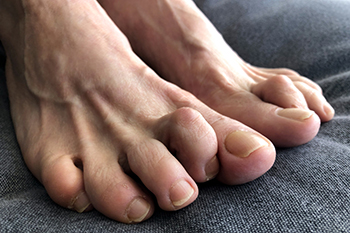
Hammertoe is a deformity where one of the toes, often the second, becomes bent in a fixed Z-shaped position. This causes discomfort and difficulty in wearing certain types of shoes and walking. Hammertoe is often the result of tendon imbalances, long metatarsal bones, and poor joint alignment. Rheumatoid arthritis, genetics, or prolonged wearing of ill-fitting shoes are other factors. The bent position of the toe can lead to excessive friction, which can result in painful calluses, corns, and even open sores on top of the affected toe. Treatment options typically involve wearing shoes with a wider toe box to reduce irritation, using orthotic devices to alleviate pain in the ball of the foot, and taping or splinting the toe to provide temporary relief. In more severe cases, where the toe is rigidly fixed and pain persists, surgery may be required to straighten the toe. If you have a painful hammertoe, it is suggested that you schedule an appointment with a podiatrist for a diagnosis and treatment options.
Hammertoe
Hammertoes can be a painful condition to live with. For more information, contact William Beaton, DPM from Advanced Podiatry and Wound Care. Our doctor will answer any of your foot- and ankle-related questions.
Hammertoe is a foot deformity that affects the joints of the second, third, fourth, or fifth toes of your feet. It is a painful foot condition in which these toes curl and arch up, which can often lead to pain when wearing footwear.
Symptoms
- Pain in the affected toes
- Development of corns or calluses due to friction
- Inflammation
- Redness
- Contracture of the toes
Causes
Genetics – People who are genetically predisposed to hammertoe are often more susceptible
Arthritis – Because arthritis affects the joints in your toes, further deformities stemming from arthritis can occur
Trauma – Direct trauma to the toes could potentially lead to hammertoe
Ill-fitting shoes – Undue pressure on the front of the toes from ill-fitting shoes can potentially lead to the development of hammertoe
Treatment
Orthotics – Custom made inserts can be used to help relieve pressure placed on the toes and therefore relieve some of the pain associated with it
Medications – Oral medications such as anti-inflammatories or NSAIDs could be used to treat the pain and inflammation hammertoes causes. Injections of corticosteroids are also sometimes used
Surgery – In more severe cases where the hammertoes have become more rigid, foot surgery is a potential option
If you have any questions please contact our office located in St. Petersburg, FL . We offer the newest diagnostic and treatment technologies for all your foot and ankle needs.
